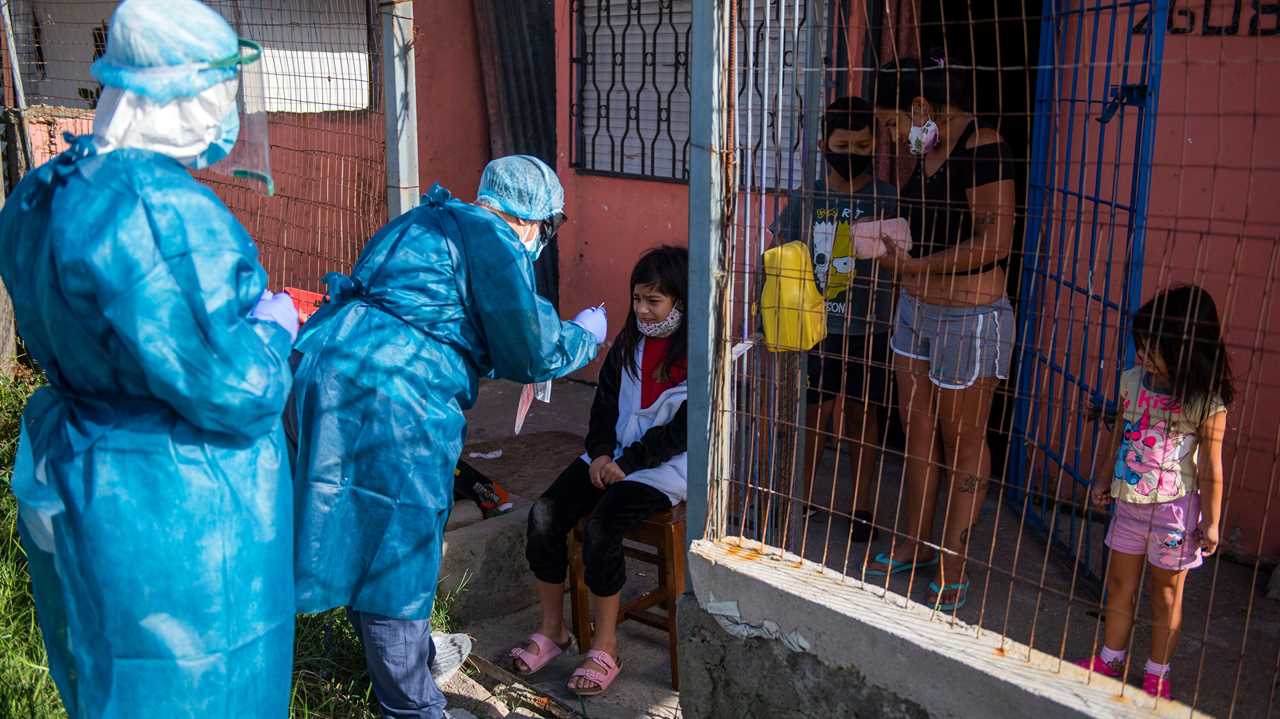
WASHINGTON — A devastating virus was laying waste to nations that lacked medicines available to Americans. The pills were patented and pricey. Poor countries lacked refrigeration to store them, the thinking went, and patients would not be able to follow the complex dosing regimen.The year was 2002, the virus was H.I.V., and the president, George W. Bush, secretly sent his top health advisers to Africa to investigate what activists were calling “medical apartheid.” In the 20 years since, the United States has led the way in building a global infrastructure for H.I.V. testing and treatment, saving an estimated 21 million lives.Now, with that history in mind, global health agencies and the Biden administration are working to bring coronavirus tests and expensive antiviral pills to low- and middle-income nations. This week, President Biden will emphasize “global test to treat” at his second international Covid-19 summit, a virtual gathering of world leaders aimed at injecting new energy into the international pandemic response.Until now, the response has been focused largely on vaccinations, which remain a high priority. But Mr. Biden will also use the summit to call on wealthy nations to donate $2 billion to purchase Covid treatments and $1 billion to purchase oxygen supplies for low- and middle-income countries, according to a senior administration official involved with the planning.In the United States, where antiviral pills to combat Covid are widely available, Mr. Biden’s “test to treat” initiative lets many patients go to pharmacies, get tested for Covid and receive a free prescription on the spot if they test positive. In low- and middle-income nations, such efforts will most likely be much more limited until generic pills arrive, probably in 2023.But the global effort faces some of the same obstacles and inequities that existed two decades ago.Rich nations, including the United States, have gobbled up much of the supply. Global health agencies do not have the money to buy the antivirals or tests, which are crucial because the medication needs to be started early in the course of infection. Drug companies, trying to protect their patents, are limiting the supply of generic alternatives in many middle-income countries, including an entire swath of Latin America.All of this is playing out against the infectious disease equivalent of a ticking time bomb.“We all expect a major new surge from Omicron or a new variant in the global south from June to September, and if that happens, we are not going to be ready with test and treat,” said Dr. Bill Rodriguez, who runs the testing arm of the ACT Accelerator, the Geneva-based consortium coordinating the global response. “It feels extremely similar — painfully, ironically, tragically similar — to what happened with H.I.V.”On Monday, ahead of the summit, the consortium, which is backed by the World Health Organization, is set to convene a discussion of global health experts and declare access to testing and treatment an “equity issue,” officials said.Mr. Biden may well show up at his own summit empty-handed. The White House has asked Congress for an additional $22.5 billion in emergency coronavirus aid, including $5 billion for the global response, but Senate Republicans are refusing to authorize any funding unless it is offset by cuts to other programs. A $10 billion compromise proposal includes no money for the global response, and it is unclear when or whether that plan will come up for a vote.“Here we are with another virus that’s creating havoc all over the world,” said Gayle Smith, who ran the State Department’s global Covid response under Mr. Biden and is now chief executive of the One Campaign, an advocacy organization. “Maybe it’s not as lethal as H.I.V., but it’s still pretty bad. And we’ve got therapeutics. How are we going to think about this? Are we going to take the lessons learned and have a plan?”One of the biggest hurdles is the rapid decline of Covid testing around the world. The W.H.O.-backed consortium recently reported that just 20 percent of the 5.7 billion tests conducted globally have been in low- and middle-income nations. Low-income countries accounted for less than 1 percent of the testing. The reasons are twofold: Countries lack money to buy the tests, and demand has dropped in regions where Covid rates are now low.“What really worries me is the testing part of this,” said Dr. Bruce Aylward, a top W.H.O. official and the consortium’s coordinator. “If you’re not testing, you can’t sequence, you can’t isolate, you can’t treat. Everything else unravels.”Paxlovid, the more powerful of the two Covid antiviral pills approved by the Food and Drug Administration, is so plentiful in the United States that pharmacies are struggling to useBy: Sheryl Gay Stolberg
Title: As Poor Nations Seek Covid Pills, Officials Fear Repeat of AIDS Crisis
Sourced From: www.nytimes.com/2022/05/08/us/politics/covid-pills-global-aids-hiv.html
Published Date: Sun, 08 May 2022 09:00:15 +0000
Read More
Did you miss our previous article...
https://badpoliticians.com/us-politics/roes-potential-end-forcing-politicians-into-a-deeper-abortion-debate
 UK PoliticsWorld PoliticsVideosPrivacy PolicyTerms And Conditions
UK PoliticsWorld PoliticsVideosPrivacy PolicyTerms And Conditions
